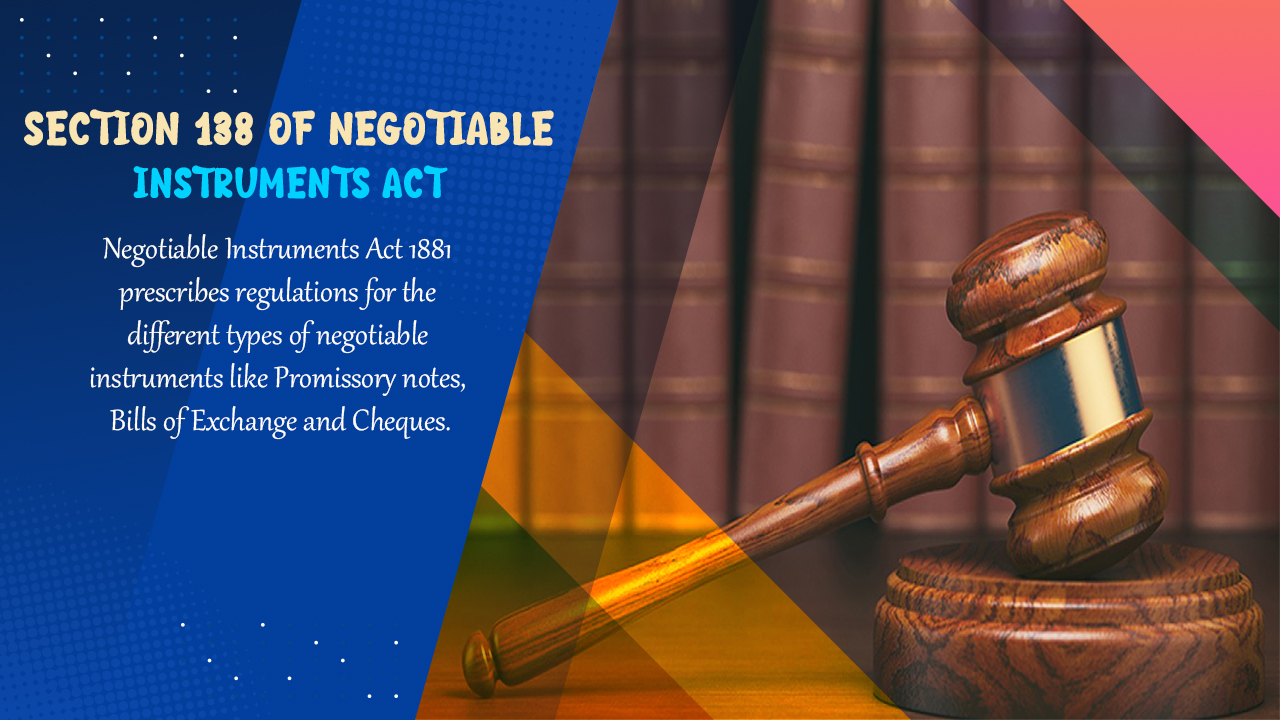Section 138 of Negotiable Instruments Act
What is meant by negotiable instruments? A negotiable instrument is a document that guarantees the payment of a specific amount of money, either on demand, or at a set time, whose payer is usually named on the document. Negotiable Instruments Act 1881 prescribes regulations for the different types of negotiable instruments like Promissory notes, Bills of Exchange and Cheques. According to Section 13 of the Act, negotiable instrument implies ‘a Promissory Note, Bills of Exchange or Cheque payable either to order or to bearer'.
Section 138 of the act lays down the penalty for dishonoring of cheques. Section 138 was introduced as a criminal offence in 1989, taken as a measure of amendment to the Negotiable Instruments Act, 1881. The main objective of introduction of this section was to encourage the use of cheques and to increase the credibility of transactions through cheques by treating dishonoring of the cheques as an offence. Section 138 provides that when the cheque is dishonored for insufficiency of funds or for any of the prescribed reasons, the one who is at default can be punished with imprisonment for a term which may extend to two years, or with fine which may extend to twice the amount of the cheque, or both. This is also a non-cognizable offence.
Track Your Status
Section 138 of Negotiable Instruments Act Registration Package
Rs.25,000/-+18% GST
- What we provide
- Documents required
- Certificate of Incorporation (CIN)
- Permanent Account Number (PAN)
- Memorandum of Association (eMOA)
- Articles of Association (eAOA)
- Director’s Identification Number (DIN No)
- Digital Signature (DSC)
- GST Registration
- Company 2 Name
- Companies Object
- Address Proof (Rent Agreement, Receipt, Electrical Bill, Owner Property tax)
- Director's PAN, Aadhar, Voter Card
- Director's Electrical Bill
- Director's Driving Licence or Passport (If any)
- Director's Last 6 months Bank statement
- Director's Photo
- Director's Email and Mobile
Section 138 of Negotiable Instruments Act 1881 states:
"Dishonour of cheque for insufficiency, etc., of funds in the account.—Where any cheque drawn by a person on an account maintained by him with a banker for payment of any amount of money to another person from out of that account for the discharge, in whole or in part, of any debt or other liability, is returned by the bank unpaid, either because of the amount of money standing to the credit of that account is insufficient to honour the cheque or that it exceeds the amount arranged to be paid from that account by an agreement made with that bank, such person shall be deemed to have committed an offence and shall, without prejudice to any other provision of this Act, be punished with imprisonment for
[a term which may be extended to two years’], or with fine which may extend to twice the amount of the cheque, or with both:
Provided that nothing contained in this section shall apply unless—
the cheque has been presented to the bank within a period of six months from the date on which it is drawn or within the period of its validity, whichever is earlier;
the payee or the holder in due course of the cheque, as the case may be, makes a demand for the payment of the said amount of money by giving a notice; in writing, to the drawer of the cheque,
[within thirty days] of the receipt of information by him from the bank regarding the return of the cheque as unpaid; and the drawer of such cheque fails to make the payment of the said amount of money to the payee or, as the case may be, to the holder in due course of the cheque, within fifteen days of the receipt of the said notice."
Thus from the above section it can be understood that dishonoring of cheques due to insufficient funds in the account or any other reason is a punishable offence.
How to inform the Debtor about return of Cheque? Sending Notice to the Defaulter to pay amount of cheque within 15 days of receipt of the notice.
If the cheque is returned unpaid from the bank, then the bearer should get the returned cheque and cheque return memo from the bank immediately. A notice should be served to the drawer within 30 days of return of the cheque informing the drawer about dishounour of the cheque and should make the demand of cheque payment within 15 days of receipt of the notice. If 30 days have elapsed after return of the cheque the drawee may present the cheque again in the bank within the specified period.
It would be better to send the notice through a lawyer.
How to file Criminal Complaint under section 138 of Negotiable Instruments Act, 1881 against return of Cheque?
If the drawee sends legal notice for payment of cheque amount against returned cheque, and the drawer does not pay the amount of cheque within 15 days of receipt of the notice, the drawee can file a criminal complaint under section 138 of Negotiable Instruments Act, 1881 within next one month in the court.
What are the Documents required for filing Complaint under section 138 of Negotiable Instruments Act 1881?
The following documents are necessary to file Complaint under section 138 of Negotiable Instruments Act.
- Memo of Parties
- Complaint Under Section 138 Negotiable Instruments Act, 1881
- Pre-Summoning Evidence/ By Way Of Affidavit (in some courts)
- List of Witnesses
- List of supporting Documents
- Vakalatnama in favour of the Counsel
Need Consultancy? Ask Tax Seva Kendra Expert@ Rs. FREE
- Free Consultancy
- Online Documentation
- Anywhere In India





